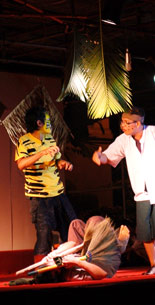ABOUT
 |
KETEP's Goals Southeast Asian cultures have many narratives depicting traditional agrarian life integrated with birds, animals, plants, rivers, seas, and mountains, but in the 21st century, more and more Asians live in cities. Modern technology has both concealed humans' dependence on eco-systems and assisted in the unsustainable exploitation of natural resources. Governments, attempting to achieve quick prosperity, have allowed local populations and multinational corporations to devastate the natural environment on land and in the sea both within and outside their national borders. Southeast Asia has some of the world's last large swathes of forests that are now disappearing through extensive logging, unregulated mining, damming, pollution, poaching, monocrop plantations, as well as the unplanned growth of cities. Governments and corporations have told people they must choose between their own material prosperity and the protection of nature, but KETEP adopts the premise that the "economy versus ecology" conflict is a false one, and that the only good economy is one based on sound ecological principles that keep harmful human impact to a minimum. Contemporary urban citizens are addicted to the convenience of cheap mass-produced and disposable goods and unthinkingly contribute to the destruction of rural areas. KETEP focuses on the behavior of the city dweller and highlights the decisions they make as consumers. KETEP performances present environmental protection not as a marginal activity or an old-fashioned "anti-progress movement," but as a necessary forward-looking perspective for urban people. |
